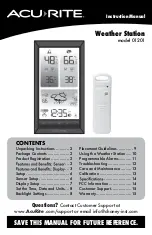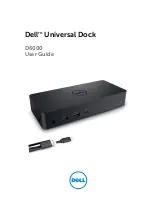
Features of the Wind Sensor
The wind sensor measures wind speed and wind direction and sends the data to the thermometer-transmitter
sensor, which in turn transmits the data to the home monitor. Operating power is taken from the thermometer-
transmitter sensor by cable connection. The wind sensor consists of the main unit with wind vane, 9m/30 ft. cable
(already attached to the main unit) mast, and base bracket.
Features of the Rain Sensor
The rain sensor measures cumulative rainfall and sends the data to the thermometer-transmitter sensor via cable
connection, which is then transmitted back to the home monitor. The cable connection also supplies operating
power from the thermometer-transmitter sensor to the Rain Sensor. The rain sensor consists of the main unit and
9m/30 ft. cable (already attached to the main unit).
4. MOUNTING
CAUTION:
Great care must be taken when mounting the HWS components. The manufactuer/supplier cannot be
held liable for personal or property damage when setting up the components. Please use caution when choosing
a mounting point.
Prior to drilling mounting holes and permanently affixing any of the units, please ensure the following points are
considered:
1. Cable lengths of the units meet with your distance requirements at mounting points.
2. Signal from the thermometer-transmitter sensor can be received by the home
monitor at mounting point.
3. Make sure the transmitter is easily accessible. You will have to periodically replace
batteries. Mount it as close to the ground as possible.
A. Home Monitor
With three retractable legs at the back of the home monitor, the unit can be placed
onto any flat surface or mounted on a wall by using a nail or screw (not provided)
• For accurate data transmission, make sure that the home monitor is not placed in
direct sunlight, or placed in an area with drafts caused by heaters or air conditioners.
• Do not mount the home monitor on a wall which has metal heat/air conditioning
ductwork or high voltage wiring in the wall behind the station, it may interfere with its ability to receive data
from the transmitter.
• Do not mount the home monitor close to fluorescent lights or other electrical appliances. Such devices
dramatically decrease signal reception, and in some cases, prevent all signals from reaching the home monitor.
• If the main unit is in area of transmission interference (e.g. on or near concrete walls, home appliances, computers
or metal objects) the distance of transmission will be drastically reduced or non-existent.
4
Desk Mount Position
Table Top Position
Wall Mount






































